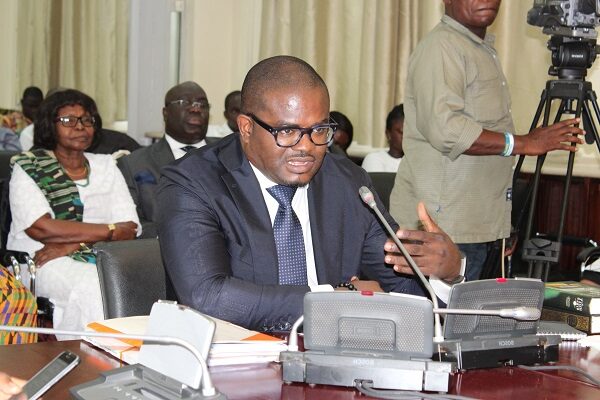Parliament has confirmed Charles Adu Boahen as a Minister of State at the Ministry of Finance.
In addition, 11 deputy ministers have also been approved by parliament to assist the work of substantive ministers.
All the 12 individuals were given the green light to serve in their appointed capacities after the fifth report of the Appointments Committee was tabled and approved by Parliament.
Although the Deputy Minority Spokesperson on Finance Committee, Isaac Adongo, had called for the rejection of the Mr Adu-Boahen, the latter was given the nod from the recommendation received from the committee.
Prior to appearing before the Committee, Mr Adongo had urged his colleagues in the Appointments Committee to deny Mr Adu-Boahen the ministerial privilege, explaining that Adu-Boahen had made GH₵856 million in fees on advising government lending since 2017 through his firm, Black Star Brokerage.
The other deputy ministers who were approved are, Benito Owusu Bio, Deputy Minister for Lands and Natural Resources, William Owuraku Aidoo, Deputy Minister for Energy, and Ama Pomaa Boateng, Deputy Minister for Communications and Digitalisation.
While Augustine Collins Ntim and Osei Bonsu Amoah, have both been approved to serve as Deputy Ministers for Local Government, Decentralisation, and Rural Development, Kwaku Asante Boateng was approved as the Deputy Minister for Railways Development.
The rest are Kwaku Ampratwum Sarpong, Deputy Minister for Foreign Affairs, Yaw Frimpong Addo, Deputy Minister for Food and Agriculture, Deputy Minister for Fisheries and Aquaculture, Moses Anim and, Nana Dokua Asiamah Adjei, Deputy Minister for Trade and Industry.
The 12 approved ministers were part of a total of individuals that the Appointments Committee of Parliament vetted between Wednesday, June 2, and Tuesday, June 15, 2021.
Meanwhile, 28 more deputy ministerial nominees are yet to be approved by parliament, having gone through the vetting exercise.
The nominees responded to questions on their personal profile and qualities that would help their respective ministers and the offices they would occupy.
The 40 nominees included eight women. Six of the total set of nominees were non-MPs.
About 11 of them had been re-nominated to occupy their deputy ministerial status though some had their portfolios changed.
















